ENTR101: Impact of SMEs and Entrepreneurship Report, Semester 1
VerifiedAdded on 2023/01/06
|15
|4024
|1
Report
AI Summary
This report provides a comprehensive analysis of entrepreneurship and small business management, focusing on the UK context. It begins by defining entrepreneurship and exploring various venture types, including serial, intrapreneurs, and owner-managers, and also different typologies of entrepreneurs such as survival, lifestyle, and aggressive growth ventures. The report then examines the significant impact of small and medium-sized enterprises (SMEs) on the UK economy, highlighting their contribution to employment and tax revenue. Furthermore, the report delves into the contribution of SMEs at local, regional, and state levels, including the role of start-up businesses. The report concludes by discussing the key aspects of the entrepreneurial mindset and the characteristics of successful entrepreneurs, contrasting them with the role of managers.

Entrepreneurship and small
business management
1
business management
1
Paraphrase This Document
Need a fresh take? Get an instant paraphrase of this document with our AI Paraphraser
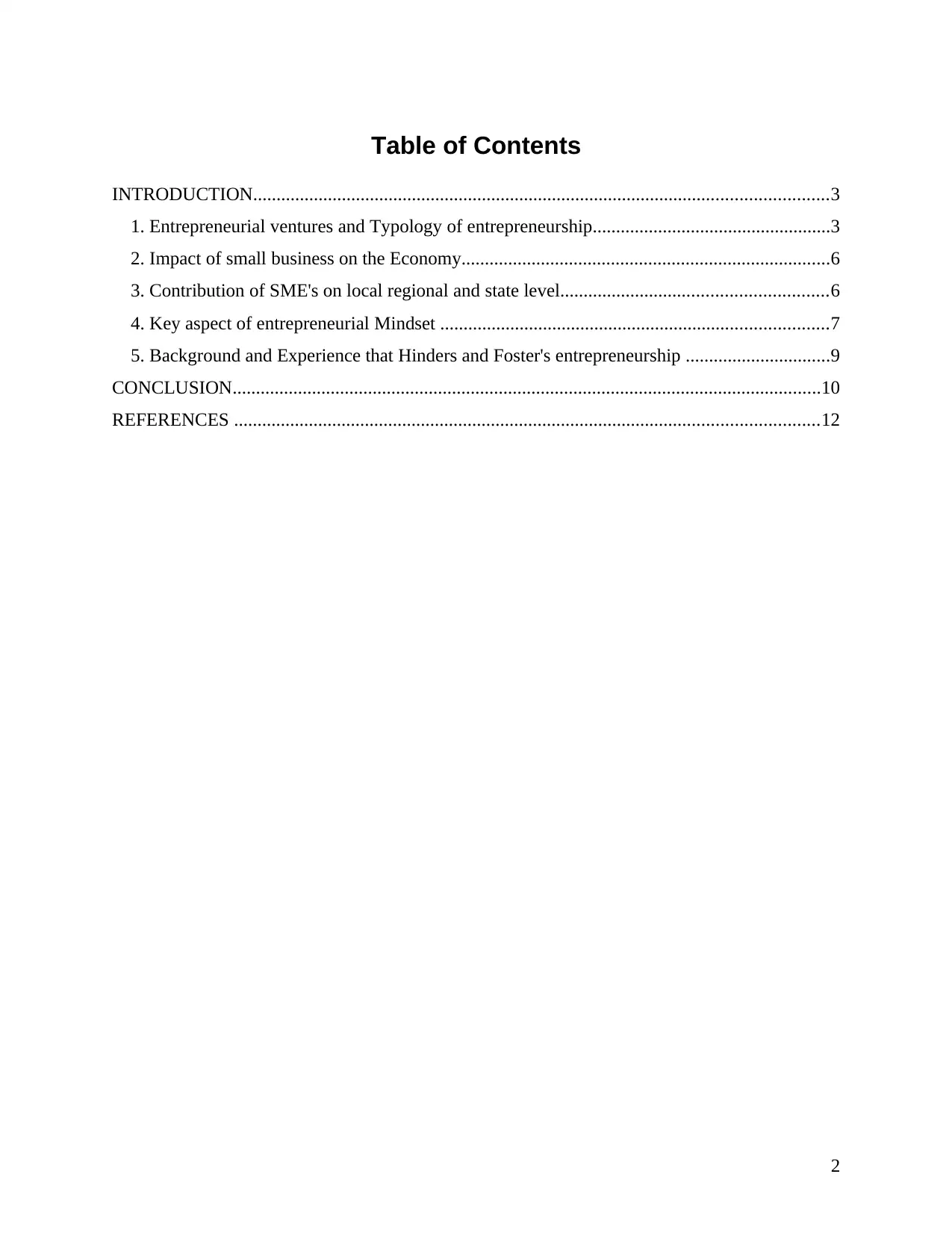
Table of Contents
INTRODUCTION...........................................................................................................................3
1. Entrepreneurial ventures and Typology of entrepreneurship...................................................3
2. Impact of small business on the Economy...............................................................................6
3. Contribution of SME's on local regional and state level.........................................................6
4. Key aspect of entrepreneurial Mindset ...................................................................................7
5. Background and Experience that Hinders and Foster's entrepreneurship ...............................9
CONCLUSION..............................................................................................................................10
REFERENCES .............................................................................................................................12
2
INTRODUCTION...........................................................................................................................3
1. Entrepreneurial ventures and Typology of entrepreneurship...................................................3
2. Impact of small business on the Economy...............................................................................6
3. Contribution of SME's on local regional and state level.........................................................6
4. Key aspect of entrepreneurial Mindset ...................................................................................7
5. Background and Experience that Hinders and Foster's entrepreneurship ...............................9
CONCLUSION..............................................................................................................................10
REFERENCES .............................................................................................................................12
2
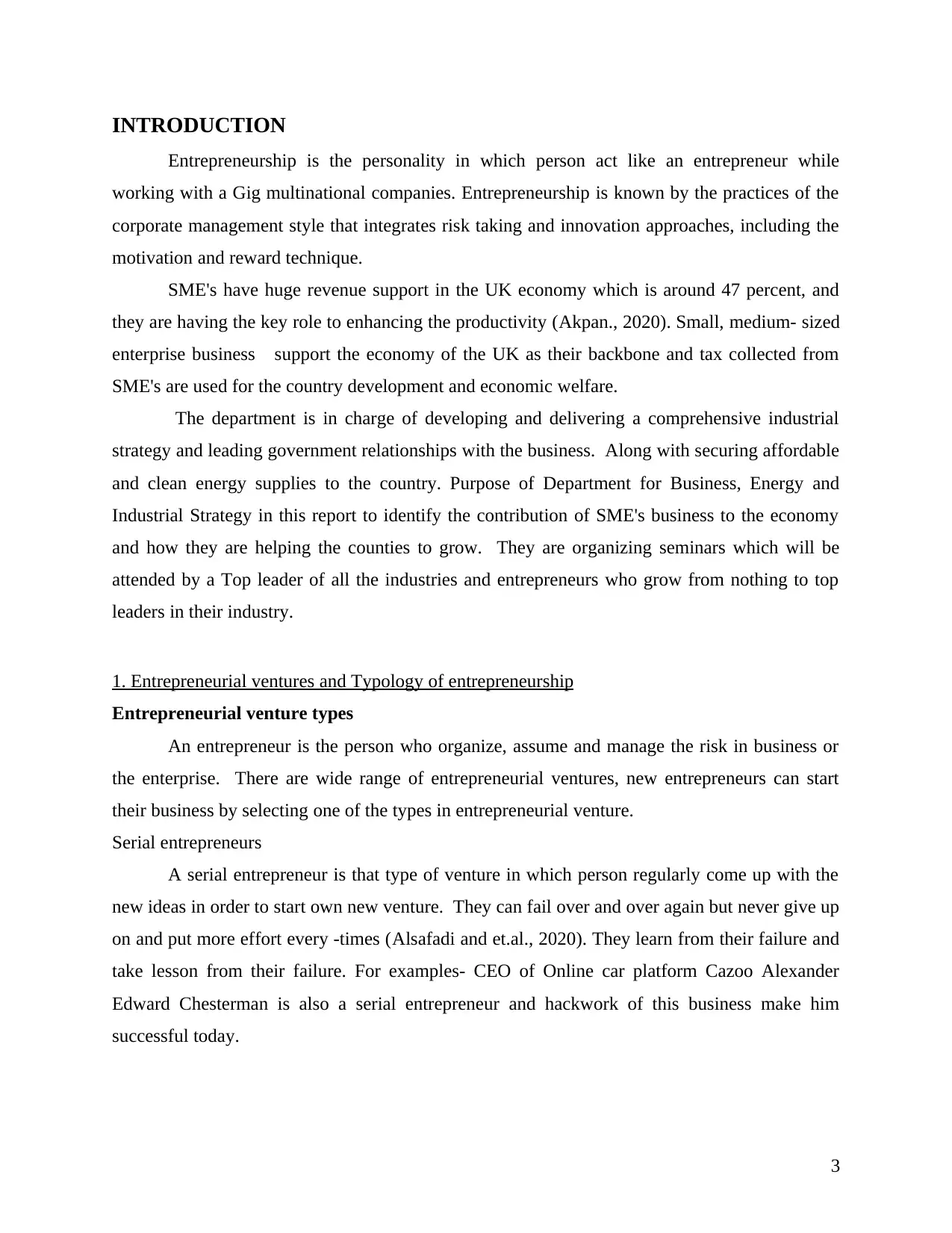
INTRODUCTION
Entrepreneurship is the personality in which person act like an entrepreneur while
working with a Gig multinational companies. Entrepreneurship is known by the practices of the
corporate management style that integrates risk taking and innovation approaches, including the
motivation and reward technique.
SME's have huge revenue support in the UK economy which is around 47 percent, and
they are having the key role to enhancing the productivity (Akpan., 2020). Small, medium- sized
enterprise business support the economy of the UK as their backbone and tax collected from
SME's are used for the country development and economic welfare.
The department is in charge of developing and delivering a comprehensive industrial
strategy and leading government relationships with the business. Along with securing affordable
and clean energy supplies to the country. Purpose of Department for Business, Energy and
Industrial Strategy in this report to identify the contribution of SME's business to the economy
and how they are helping the counties to grow. They are organizing seminars which will be
attended by a Top leader of all the industries and entrepreneurs who grow from nothing to top
leaders in their industry.
1. Entrepreneurial ventures and Typology of entrepreneurship
Entrepreneurial venture types
An entrepreneur is the person who organize, assume and manage the risk in business or
the enterprise. There are wide range of entrepreneurial ventures, new entrepreneurs can start
their business by selecting one of the types in entrepreneurial venture.
Serial entrepreneurs
A serial entrepreneur is that type of venture in which person regularly come up with the
new ideas in order to start own new venture. They can fail over and over again but never give up
on and put more effort every -times (Alsafadi and et.al., 2020). They learn from their failure and
take lesson from their failure. For examples- CEO of Online car platform Cazoo Alexander
Edward Chesterman is also a serial entrepreneur and hackwork of this business make him
successful today.
3
Entrepreneurship is the personality in which person act like an entrepreneur while
working with a Gig multinational companies. Entrepreneurship is known by the practices of the
corporate management style that integrates risk taking and innovation approaches, including the
motivation and reward technique.
SME's have huge revenue support in the UK economy which is around 47 percent, and
they are having the key role to enhancing the productivity (Akpan., 2020). Small, medium- sized
enterprise business support the economy of the UK as their backbone and tax collected from
SME's are used for the country development and economic welfare.
The department is in charge of developing and delivering a comprehensive industrial
strategy and leading government relationships with the business. Along with securing affordable
and clean energy supplies to the country. Purpose of Department for Business, Energy and
Industrial Strategy in this report to identify the contribution of SME's business to the economy
and how they are helping the counties to grow. They are organizing seminars which will be
attended by a Top leader of all the industries and entrepreneurs who grow from nothing to top
leaders in their industry.
1. Entrepreneurial ventures and Typology of entrepreneurship
Entrepreneurial venture types
An entrepreneur is the person who organize, assume and manage the risk in business or
the enterprise. There are wide range of entrepreneurial ventures, new entrepreneurs can start
their business by selecting one of the types in entrepreneurial venture.
Serial entrepreneurs
A serial entrepreneur is that type of venture in which person regularly come up with the
new ideas in order to start own new venture. They can fail over and over again but never give up
on and put more effort every -times (Alsafadi and et.al., 2020). They learn from their failure and
take lesson from their failure. For examples- CEO of Online car platform Cazoo Alexander
Edward Chesterman is also a serial entrepreneur and hackwork of this business make him
successful today.
3
⊘ This is a preview!⊘
Do you want full access?
Subscribe today to unlock all pages.

Trusted by 1+ million students worldwide
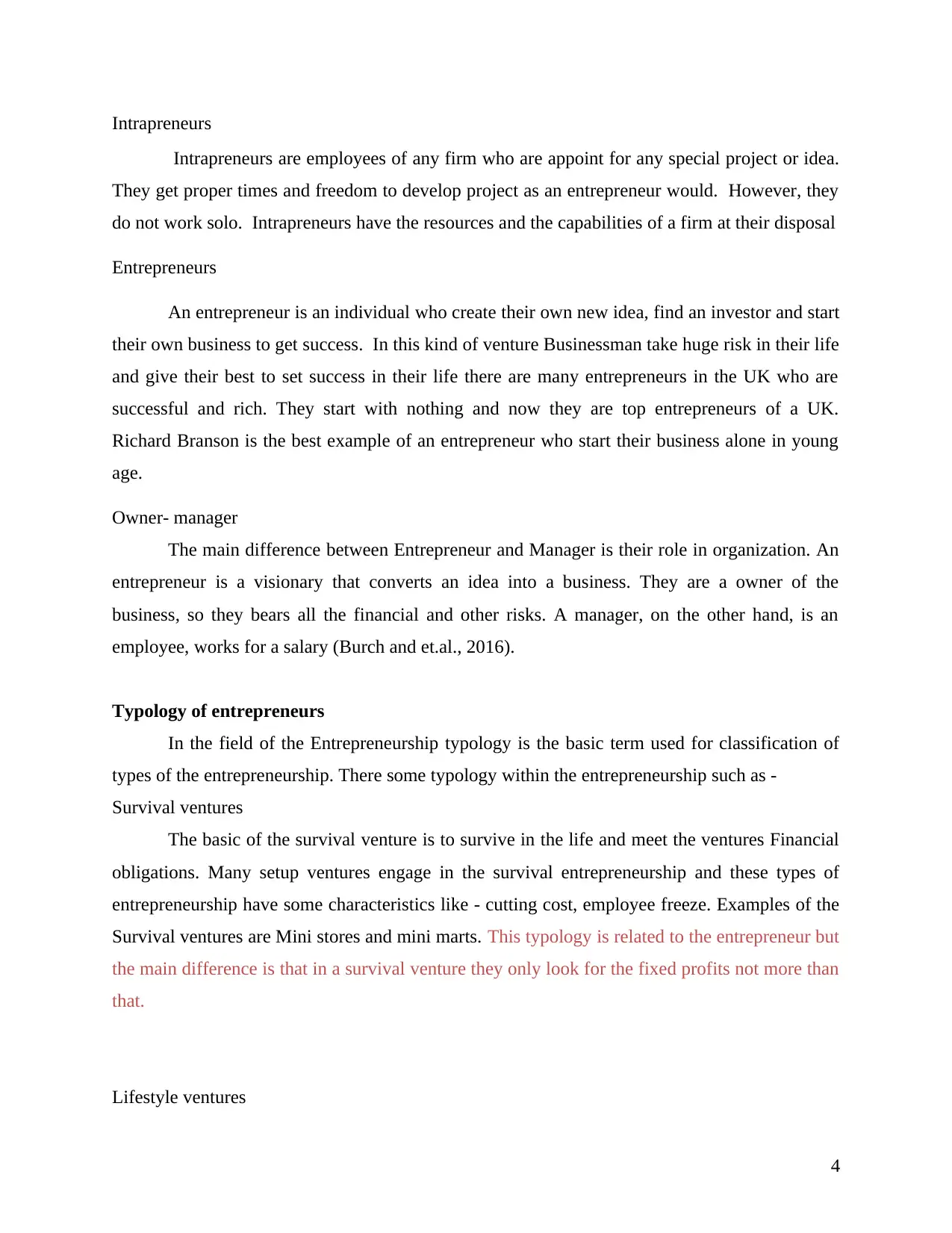
Intrapreneurs
Intrapreneurs are employees of any firm who are appoint for any special project or idea.
They get proper times and freedom to develop project as an entrepreneur would. However, they
do not work solo. Intrapreneurs have the resources and the capabilities of a firm at their disposal
Entrepreneurs
An entrepreneur is an individual who create their own new idea, find an investor and start
their own business to get success. In this kind of venture Businessman take huge risk in their life
and give their best to set success in their life there are many entrepreneurs in the UK who are
successful and rich. They start with nothing and now they are top entrepreneurs of a UK.
Richard Branson is the best example of an entrepreneur who start their business alone in young
age.
Owner- manager
The main difference between Entrepreneur and Manager is their role in organization. An
entrepreneur is a visionary that converts an idea into a business. They are a owner of the
business, so they bears all the financial and other risks. A manager, on the other hand, is an
employee, works for a salary (Burch and et.al., 2016).
Typology of entrepreneurs
In the field of the Entrepreneurship typology is the basic term used for classification of
types of the entrepreneurship. There some typology within the entrepreneurship such as -
Survival ventures
The basic of the survival venture is to survive in the life and meet the ventures Financial
obligations. Many setup ventures engage in the survival entrepreneurship and these types of
entrepreneurship have some characteristics like - cutting cost, employee freeze. Examples of the
Survival ventures are Mini stores and mini marts. This typology is related to the entrepreneur but
the main difference is that in a survival venture they only look for the fixed profits not more than
that.
Lifestyle ventures
4
Intrapreneurs are employees of any firm who are appoint for any special project or idea.
They get proper times and freedom to develop project as an entrepreneur would. However, they
do not work solo. Intrapreneurs have the resources and the capabilities of a firm at their disposal
Entrepreneurs
An entrepreneur is an individual who create their own new idea, find an investor and start
their own business to get success. In this kind of venture Businessman take huge risk in their life
and give their best to set success in their life there are many entrepreneurs in the UK who are
successful and rich. They start with nothing and now they are top entrepreneurs of a UK.
Richard Branson is the best example of an entrepreneur who start their business alone in young
age.
Owner- manager
The main difference between Entrepreneur and Manager is their role in organization. An
entrepreneur is a visionary that converts an idea into a business. They are a owner of the
business, so they bears all the financial and other risks. A manager, on the other hand, is an
employee, works for a salary (Burch and et.al., 2016).
Typology of entrepreneurs
In the field of the Entrepreneurship typology is the basic term used for classification of
types of the entrepreneurship. There some typology within the entrepreneurship such as -
Survival ventures
The basic of the survival venture is to survive in the life and meet the ventures Financial
obligations. Many setup ventures engage in the survival entrepreneurship and these types of
entrepreneurship have some characteristics like - cutting cost, employee freeze. Examples of the
Survival ventures are Mini stores and mini marts. This typology is related to the entrepreneur but
the main difference is that in a survival venture they only look for the fixed profits not more than
that.
Lifestyle ventures
4
Paraphrase This Document
Need a fresh take? Get an instant paraphrase of this document with our AI Paraphraser
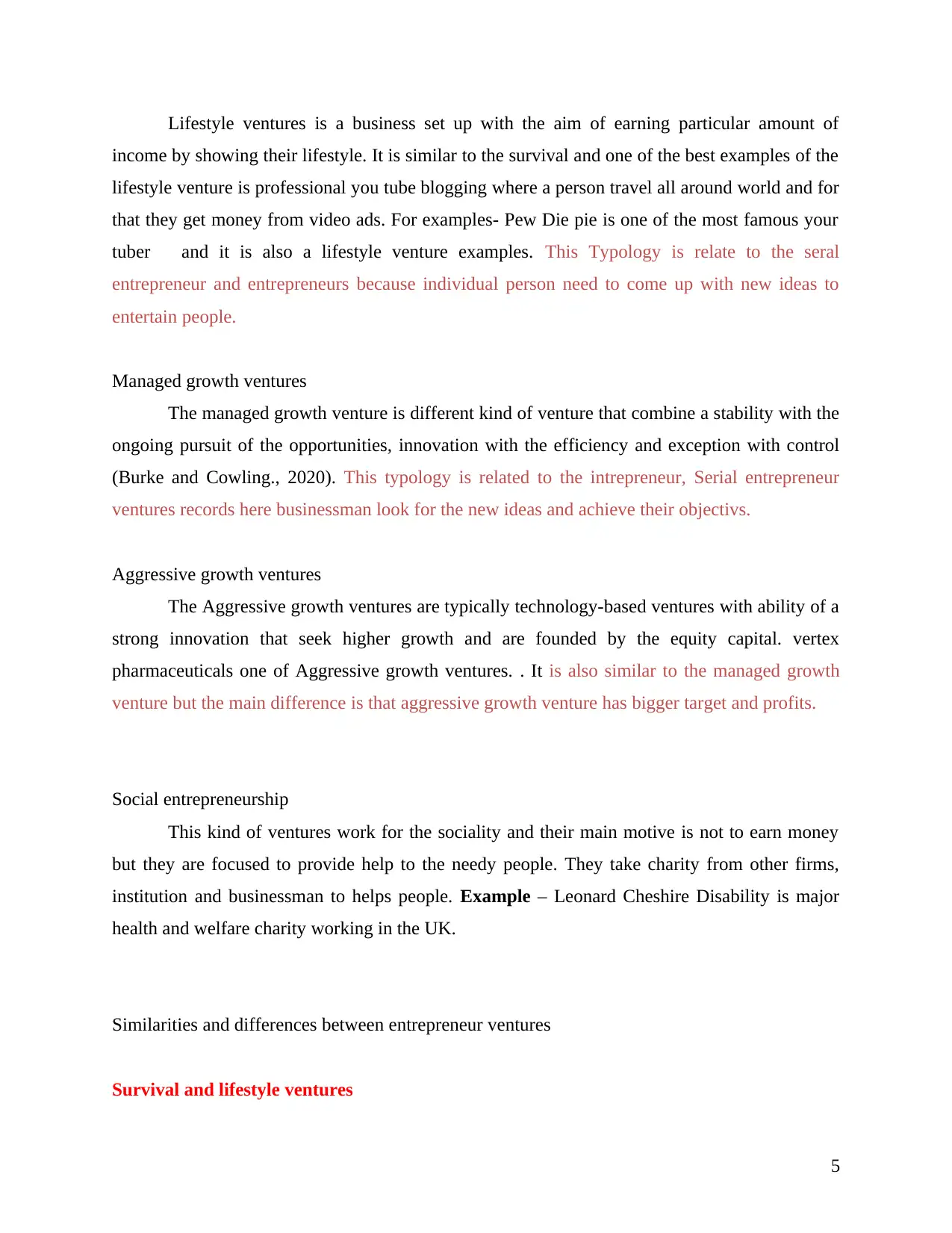
Lifestyle ventures is a business set up with the aim of earning particular amount of
income by showing their lifestyle. It is similar to the survival and one of the best examples of the
lifestyle venture is professional you tube blogging where a person travel all around world and for
that they get money from video ads. For examples- Pew Die pie is one of the most famous your
tuber and it is also a lifestyle venture examples. This Typology is relate to the seral
entrepreneur and entrepreneurs because individual person need to come up with new ideas to
entertain people.
Managed growth ventures
The managed growth venture is different kind of venture that combine a stability with the
ongoing pursuit of the opportunities, innovation with the efficiency and exception with control
(Burke and Cowling., 2020). This typology is related to the intrepreneur, Serial entrepreneur
ventures records here businessman look for the new ideas and achieve their objectivs.
Aggressive growth ventures
The Aggressive growth ventures are typically technology-based ventures with ability of a
strong innovation that seek higher growth and are founded by the equity capital. vertex
pharmaceuticals one of Aggressive growth ventures. . It is also similar to the managed growth
venture but the main difference is that aggressive growth venture has bigger target and profits.
Social entrepreneurship
This kind of ventures work for the sociality and their main motive is not to earn money
but they are focused to provide help to the needy people. They take charity from other firms,
institution and businessman to helps people. Example – Leonard Cheshire Disability is major
health and welfare charity working in the UK.
Similarities and differences between entrepreneur ventures
Survival and lifestyle ventures
5
income by showing their lifestyle. It is similar to the survival and one of the best examples of the
lifestyle venture is professional you tube blogging where a person travel all around world and for
that they get money from video ads. For examples- Pew Die pie is one of the most famous your
tuber and it is also a lifestyle venture examples. This Typology is relate to the seral
entrepreneur and entrepreneurs because individual person need to come up with new ideas to
entertain people.
Managed growth ventures
The managed growth venture is different kind of venture that combine a stability with the
ongoing pursuit of the opportunities, innovation with the efficiency and exception with control
(Burke and Cowling., 2020). This typology is related to the intrepreneur, Serial entrepreneur
ventures records here businessman look for the new ideas and achieve their objectivs.
Aggressive growth ventures
The Aggressive growth ventures are typically technology-based ventures with ability of a
strong innovation that seek higher growth and are founded by the equity capital. vertex
pharmaceuticals one of Aggressive growth ventures. . It is also similar to the managed growth
venture but the main difference is that aggressive growth venture has bigger target and profits.
Social entrepreneurship
This kind of ventures work for the sociality and their main motive is not to earn money
but they are focused to provide help to the needy people. They take charity from other firms,
institution and businessman to helps people. Example – Leonard Cheshire Disability is major
health and welfare charity working in the UK.
Similarities and differences between entrepreneur ventures
Survival and lifestyle ventures
5
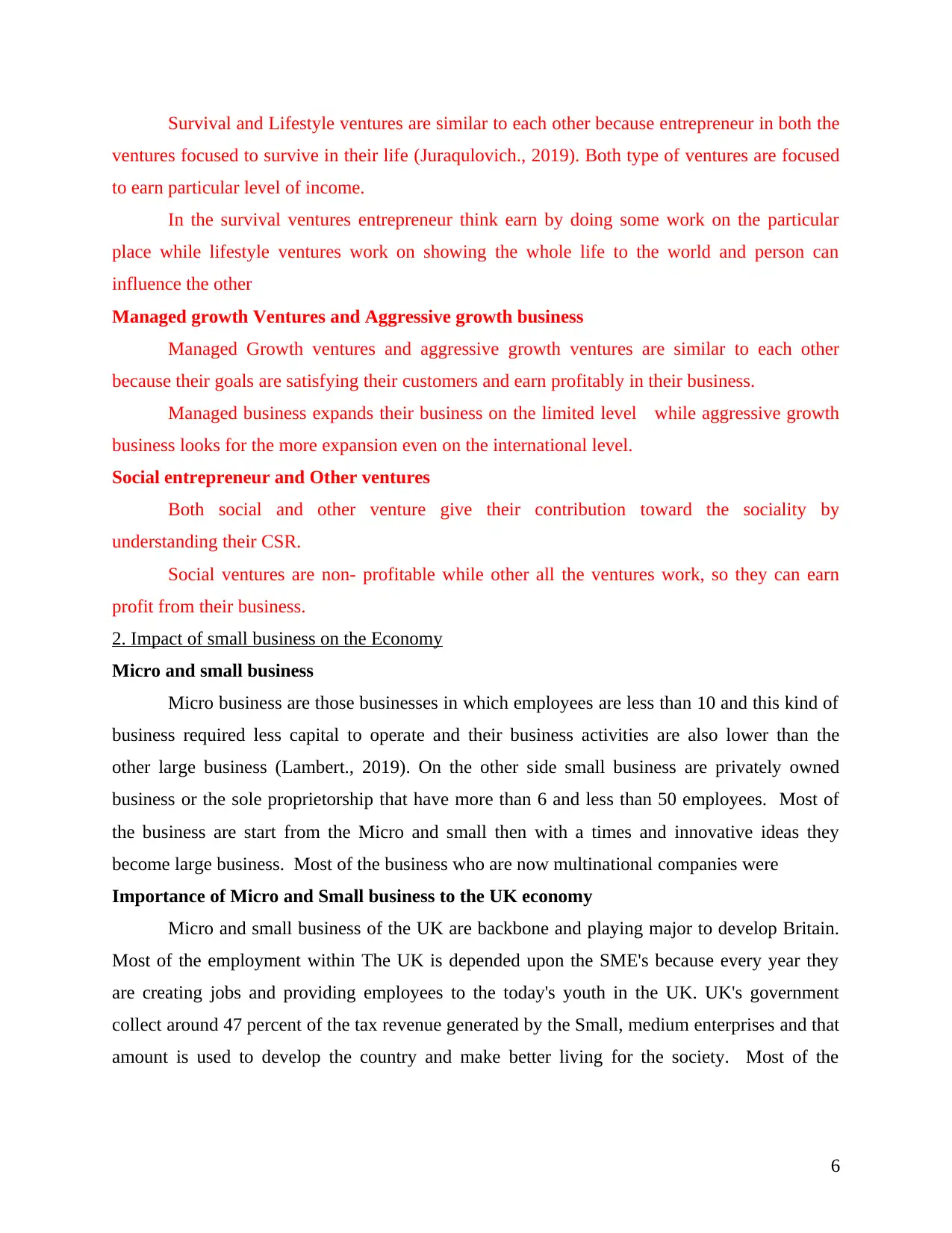
Survival and Lifestyle ventures are similar to each other because entrepreneur in both the
ventures focused to survive in their life (Juraqulovich., 2019). Both type of ventures are focused
to earn particular level of income.
In the survival ventures entrepreneur think earn by doing some work on the particular
place while lifestyle ventures work on showing the whole life to the world and person can
influence the other
Managed growth Ventures and Aggressive growth business
Managed Growth ventures and aggressive growth ventures are similar to each other
because their goals are satisfying their customers and earn profitably in their business.
Managed business expands their business on the limited level while aggressive growth
business looks for the more expansion even on the international level.
Social entrepreneur and Other ventures
Both social and other venture give their contribution toward the sociality by
understanding their CSR.
Social ventures are non- profitable while other all the ventures work, so they can earn
profit from their business.
2. Impact of small business on the Economy
Micro and small business
Micro business are those businesses in which employees are less than 10 and this kind of
business required less capital to operate and their business activities are also lower than the
other large business (Lambert., 2019). On the other side small business are privately owned
business or the sole proprietorship that have more than 6 and less than 50 employees. Most of
the business are start from the Micro and small then with a times and innovative ideas they
become large business. Most of the business who are now multinational companies were
Importance of Micro and Small business to the UK economy
Micro and small business of the UK are backbone and playing major to develop Britain.
Most of the employment within The UK is depended upon the SME's because every year they
are creating jobs and providing employees to the today's youth in the UK. UK's government
collect around 47 percent of the tax revenue generated by the Small, medium enterprises and that
amount is used to develop the country and make better living for the society. Most of the
6
ventures focused to survive in their life (Juraqulovich., 2019). Both type of ventures are focused
to earn particular level of income.
In the survival ventures entrepreneur think earn by doing some work on the particular
place while lifestyle ventures work on showing the whole life to the world and person can
influence the other
Managed growth Ventures and Aggressive growth business
Managed Growth ventures and aggressive growth ventures are similar to each other
because their goals are satisfying their customers and earn profitably in their business.
Managed business expands their business on the limited level while aggressive growth
business looks for the more expansion even on the international level.
Social entrepreneur and Other ventures
Both social and other venture give their contribution toward the sociality by
understanding their CSR.
Social ventures are non- profitable while other all the ventures work, so they can earn
profit from their business.
2. Impact of small business on the Economy
Micro and small business
Micro business are those businesses in which employees are less than 10 and this kind of
business required less capital to operate and their business activities are also lower than the
other large business (Lambert., 2019). On the other side small business are privately owned
business or the sole proprietorship that have more than 6 and less than 50 employees. Most of
the business are start from the Micro and small then with a times and innovative ideas they
become large business. Most of the business who are now multinational companies were
Importance of Micro and Small business to the UK economy
Micro and small business of the UK are backbone and playing major to develop Britain.
Most of the employment within The UK is depended upon the SME's because every year they
are creating jobs and providing employees to the today's youth in the UK. UK's government
collect around 47 percent of the tax revenue generated by the Small, medium enterprises and that
amount is used to develop the country and make better living for the society. Most of the
6
⊘ This is a preview!⊘
Do you want full access?
Subscribe today to unlock all pages.

Trusted by 1+ million students worldwide
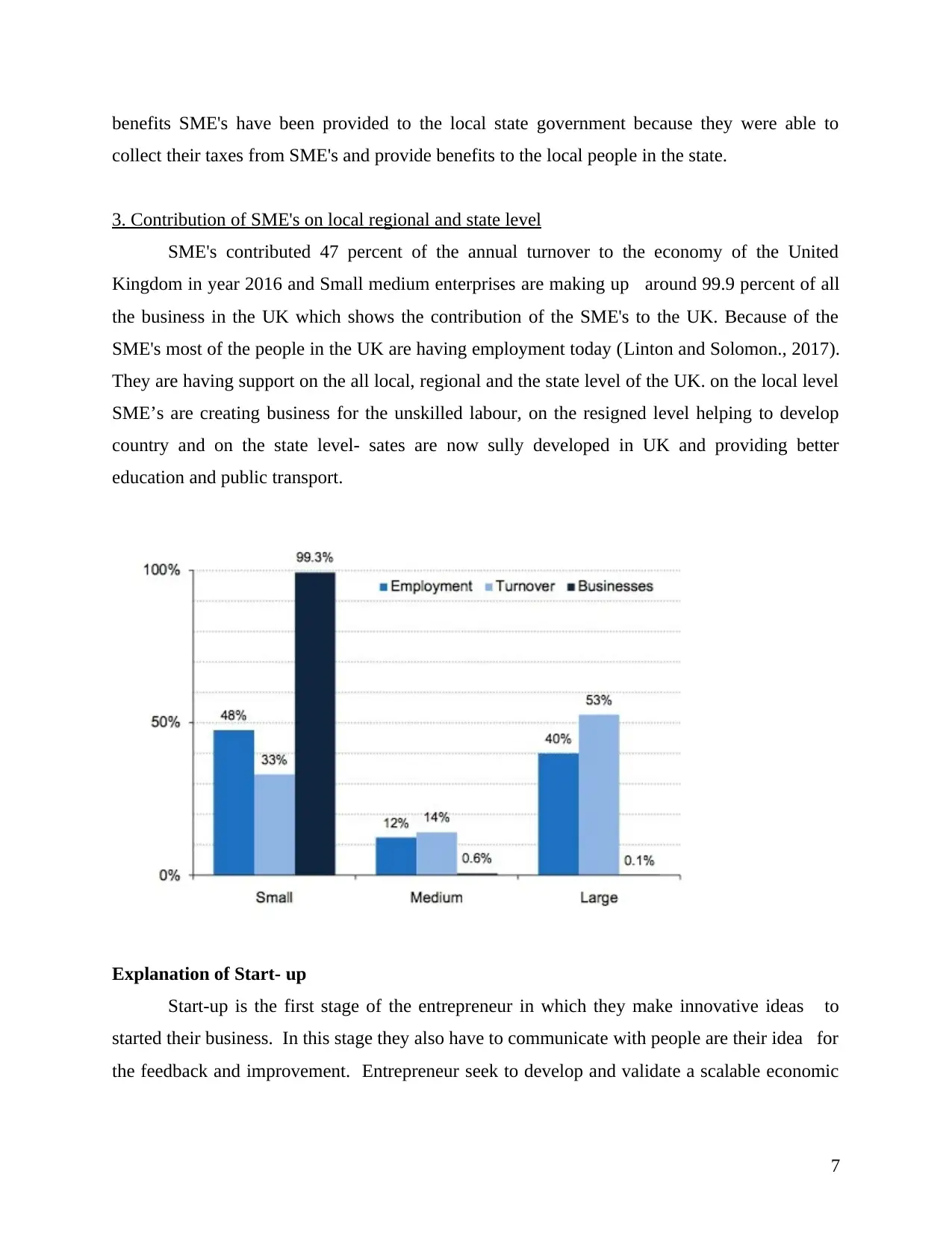
benefits SME's have been provided to the local state government because they were able to
collect their taxes from SME's and provide benefits to the local people in the state.
3. Contribution of SME's on local regional and state level
SME's contributed 47 percent of the annual turnover to the economy of the United
Kingdom in year 2016 and Small medium enterprises are making up around 99.9 percent of all
the business in the UK which shows the contribution of the SME's to the UK. Because of the
SME's most of the people in the UK are having employment today (Linton and Solomon., 2017).
They are having support on the all local, regional and the state level of the UK. on the local level
SME’s are creating business for the unskilled labour, on the resigned level helping to develop
country and on the state level- sates are now sully developed in UK and providing better
education and public transport.
Explanation of Start- up
Start-up is the first stage of the entrepreneur in which they make innovative ideas to
started their business. In this stage they also have to communicate with people are their idea for
the feedback and improvement. Entrepreneur seek to develop and validate a scalable economic
7
collect their taxes from SME's and provide benefits to the local people in the state.
3. Contribution of SME's on local regional and state level
SME's contributed 47 percent of the annual turnover to the economy of the United
Kingdom in year 2016 and Small medium enterprises are making up around 99.9 percent of all
the business in the UK which shows the contribution of the SME's to the UK. Because of the
SME's most of the people in the UK are having employment today (Linton and Solomon., 2017).
They are having support on the all local, regional and the state level of the UK. on the local level
SME’s are creating business for the unskilled labour, on the resigned level helping to develop
country and on the state level- sates are now sully developed in UK and providing better
education and public transport.
Explanation of Start- up
Start-up is the first stage of the entrepreneur in which they make innovative ideas to
started their business. In this stage they also have to communicate with people are their idea for
the feedback and improvement. Entrepreneur seek to develop and validate a scalable economic
7
Paraphrase This Document
Need a fresh take? Get an instant paraphrase of this document with our AI Paraphraser
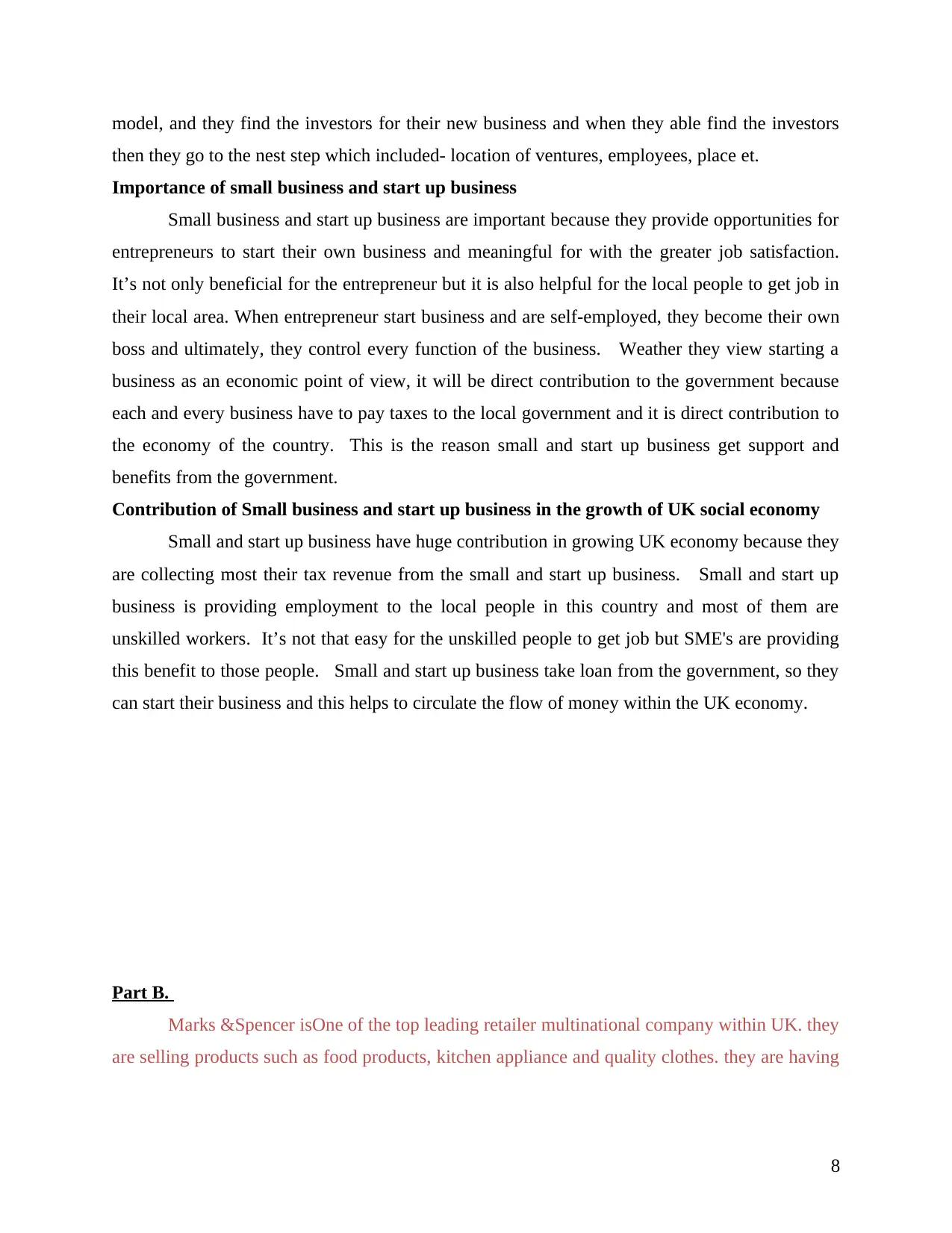
model, and they find the investors for their new business and when they able find the investors
then they go to the nest step which included- location of ventures, employees, place et.
Importance of small business and start up business
Small business and start up business are important because they provide opportunities for
entrepreneurs to start their own business and meaningful for with the greater job satisfaction.
It’s not only beneficial for the entrepreneur but it is also helpful for the local people to get job in
their local area. When entrepreneur start business and are self-employed, they become their own
boss and ultimately, they control every function of the business. Weather they view starting a
business as an economic point of view, it will be direct contribution to the government because
each and every business have to pay taxes to the local government and it is direct contribution to
the economy of the country. This is the reason small and start up business get support and
benefits from the government.
Contribution of Small business and start up business in the growth of UK social economy
Small and start up business have huge contribution in growing UK economy because they
are collecting most their tax revenue from the small and start up business. Small and start up
business is providing employment to the local people in this country and most of them are
unskilled workers. It’s not that easy for the unskilled people to get job but SME's are providing
this benefit to those people. Small and start up business take loan from the government, so they
can start their business and this helps to circulate the flow of money within the UK economy.
Part B.
Marks &Spencer isOne of the top leading retailer multinational company within UK. they
are selling products such as food products, kitchen appliance and quality clothes. they are having
8
then they go to the nest step which included- location of ventures, employees, place et.
Importance of small business and start up business
Small business and start up business are important because they provide opportunities for
entrepreneurs to start their own business and meaningful for with the greater job satisfaction.
It’s not only beneficial for the entrepreneur but it is also helpful for the local people to get job in
their local area. When entrepreneur start business and are self-employed, they become their own
boss and ultimately, they control every function of the business. Weather they view starting a
business as an economic point of view, it will be direct contribution to the government because
each and every business have to pay taxes to the local government and it is direct contribution to
the economy of the country. This is the reason small and start up business get support and
benefits from the government.
Contribution of Small business and start up business in the growth of UK social economy
Small and start up business have huge contribution in growing UK economy because they
are collecting most their tax revenue from the small and start up business. Small and start up
business is providing employment to the local people in this country and most of them are
unskilled workers. It’s not that easy for the unskilled people to get job but SME's are providing
this benefit to those people. Small and start up business take loan from the government, so they
can start their business and this helps to circulate the flow of money within the UK economy.
Part B.
Marks &Spencer isOne of the top leading retailer multinational company within UK. they
are selling products such as food products, kitchen appliance and quality clothes. they are having
8
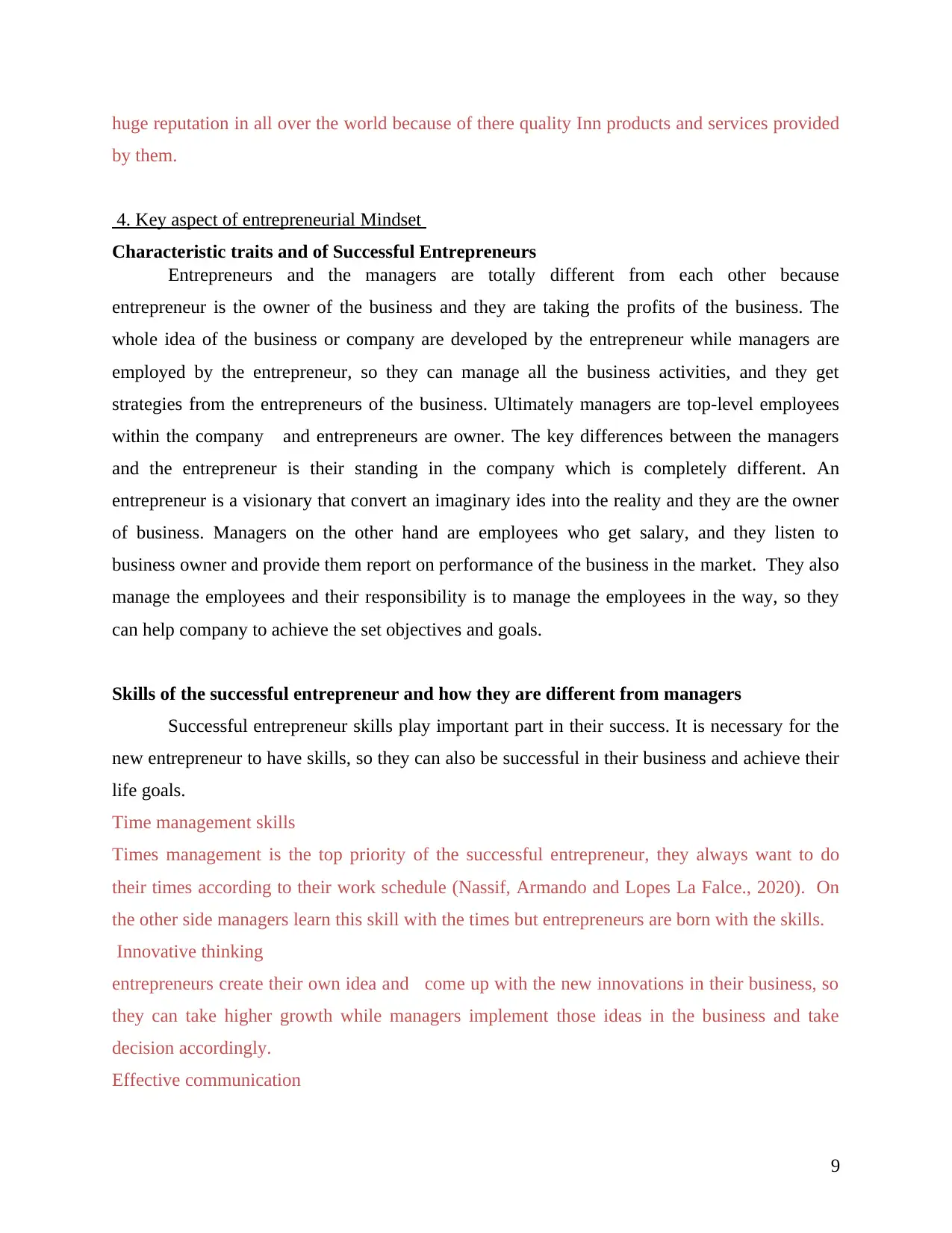
huge reputation in all over the world because of there quality Inn products and services provided
by them.
4. Key aspect of entrepreneurial Mindset
Characteristic traits and of Successful Entrepreneurs
Entrepreneurs and the managers are totally different from each other because
entrepreneur is the owner of the business and they are taking the profits of the business. The
whole idea of the business or company are developed by the entrepreneur while managers are
employed by the entrepreneur, so they can manage all the business activities, and they get
strategies from the entrepreneurs of the business. Ultimately managers are top-level employees
within the company and entrepreneurs are owner. The key differences between the managers
and the entrepreneur is their standing in the company which is completely different. An
entrepreneur is a visionary that convert an imaginary ides into the reality and they are the owner
of business. Managers on the other hand are employees who get salary, and they listen to
business owner and provide them report on performance of the business in the market. They also
manage the employees and their responsibility is to manage the employees in the way, so they
can help company to achieve the set objectives and goals.
Skills of the successful entrepreneur and how they are different from managers
Successful entrepreneur skills play important part in their success. It is necessary for the
new entrepreneur to have skills, so they can also be successful in their business and achieve their
life goals.
Time management skills
Times management is the top priority of the successful entrepreneur, they always want to do
their times according to their work schedule (Nassif, Armando and Lopes La Falce., 2020). On
the other side managers learn this skill with the times but entrepreneurs are born with the skills.
Innovative thinking
entrepreneurs create their own idea and come up with the new innovations in their business, so
they can take higher growth while managers implement those ideas in the business and take
decision accordingly.
Effective communication
9
by them.
4. Key aspect of entrepreneurial Mindset
Characteristic traits and of Successful Entrepreneurs
Entrepreneurs and the managers are totally different from each other because
entrepreneur is the owner of the business and they are taking the profits of the business. The
whole idea of the business or company are developed by the entrepreneur while managers are
employed by the entrepreneur, so they can manage all the business activities, and they get
strategies from the entrepreneurs of the business. Ultimately managers are top-level employees
within the company and entrepreneurs are owner. The key differences between the managers
and the entrepreneur is their standing in the company which is completely different. An
entrepreneur is a visionary that convert an imaginary ides into the reality and they are the owner
of business. Managers on the other hand are employees who get salary, and they listen to
business owner and provide them report on performance of the business in the market. They also
manage the employees and their responsibility is to manage the employees in the way, so they
can help company to achieve the set objectives and goals.
Skills of the successful entrepreneur and how they are different from managers
Successful entrepreneur skills play important part in their success. It is necessary for the
new entrepreneur to have skills, so they can also be successful in their business and achieve their
life goals.
Time management skills
Times management is the top priority of the successful entrepreneur, they always want to do
their times according to their work schedule (Nassif, Armando and Lopes La Falce., 2020). On
the other side managers learn this skill with the times but entrepreneurs are born with the skills.
Innovative thinking
entrepreneurs create their own idea and come up with the new innovations in their business, so
they can take higher growth while managers implement those ideas in the business and take
decision accordingly.
Effective communication
9
⊘ This is a preview!⊘
Do you want full access?
Subscribe today to unlock all pages.

Trusted by 1+ million students worldwide
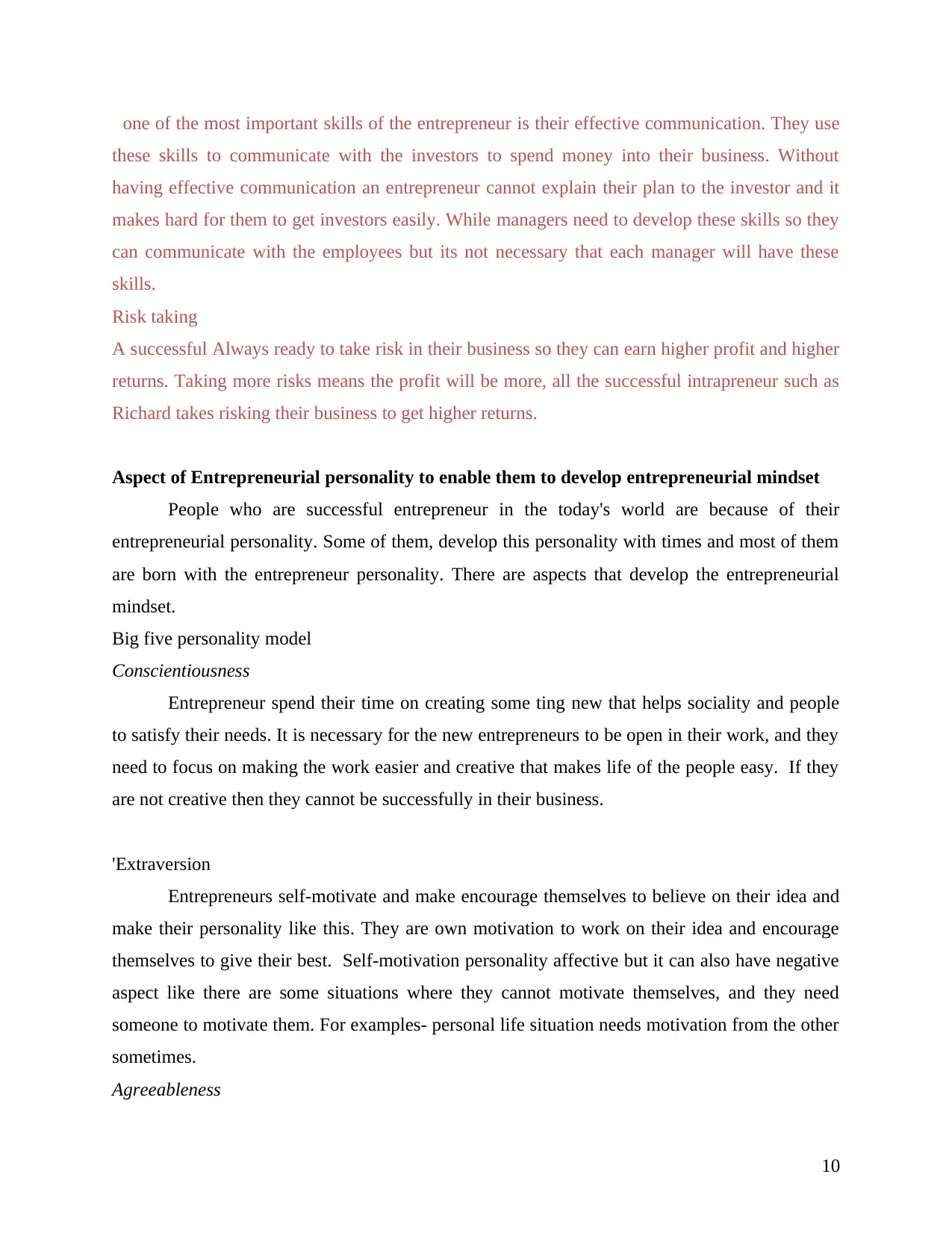
one of the most important skills of the entrepreneur is their effective communication. They use
these skills to communicate with the investors to spend money into their business. Without
having effective communication an entrepreneur cannot explain their plan to the investor and it
makes hard for them to get investors easily. While managers need to develop these skills so they
can communicate with the employees but its not necessary that each manager will have these
skills.
Risk taking
A successful Always ready to take risk in their business so they can earn higher profit and higher
returns. Taking more risks means the profit will be more, all the successful intrapreneur such as
Richard takes risking their business to get higher returns.
Aspect of Entrepreneurial personality to enable them to develop entrepreneurial mindset
People who are successful entrepreneur in the today's world are because of their
entrepreneurial personality. Some of them, develop this personality with times and most of them
are born with the entrepreneur personality. There are aspects that develop the entrepreneurial
mindset.
Big five personality model
Conscientiousness
Entrepreneur spend their time on creating some ting new that helps sociality and people
to satisfy their needs. It is necessary for the new entrepreneurs to be open in their work, and they
need to focus on making the work easier and creative that makes life of the people easy. If they
are not creative then they cannot be successfully in their business.
'Extraversion
Entrepreneurs self-motivate and make encourage themselves to believe on their idea and
make their personality like this. They are own motivation to work on their idea and encourage
themselves to give their best. Self-motivation personality affective but it can also have negative
aspect like there are some situations where they cannot motivate themselves, and they need
someone to motivate them. For examples- personal life situation needs motivation from the other
sometimes.
Agreeableness
10
these skills to communicate with the investors to spend money into their business. Without
having effective communication an entrepreneur cannot explain their plan to the investor and it
makes hard for them to get investors easily. While managers need to develop these skills so they
can communicate with the employees but its not necessary that each manager will have these
skills.
Risk taking
A successful Always ready to take risk in their business so they can earn higher profit and higher
returns. Taking more risks means the profit will be more, all the successful intrapreneur such as
Richard takes risking their business to get higher returns.
Aspect of Entrepreneurial personality to enable them to develop entrepreneurial mindset
People who are successful entrepreneur in the today's world are because of their
entrepreneurial personality. Some of them, develop this personality with times and most of them
are born with the entrepreneur personality. There are aspects that develop the entrepreneurial
mindset.
Big five personality model
Conscientiousness
Entrepreneur spend their time on creating some ting new that helps sociality and people
to satisfy their needs. It is necessary for the new entrepreneurs to be open in their work, and they
need to focus on making the work easier and creative that makes life of the people easy. If they
are not creative then they cannot be successfully in their business.
'Extraversion
Entrepreneurs self-motivate and make encourage themselves to believe on their idea and
make their personality like this. They are own motivation to work on their idea and encourage
themselves to give their best. Self-motivation personality affective but it can also have negative
aspect like there are some situations where they cannot motivate themselves, and they need
someone to motivate them. For examples- personal life situation needs motivation from the other
sometimes.
Agreeableness
10
Paraphrase This Document
Need a fresh take? Get an instant paraphrase of this document with our AI Paraphraser
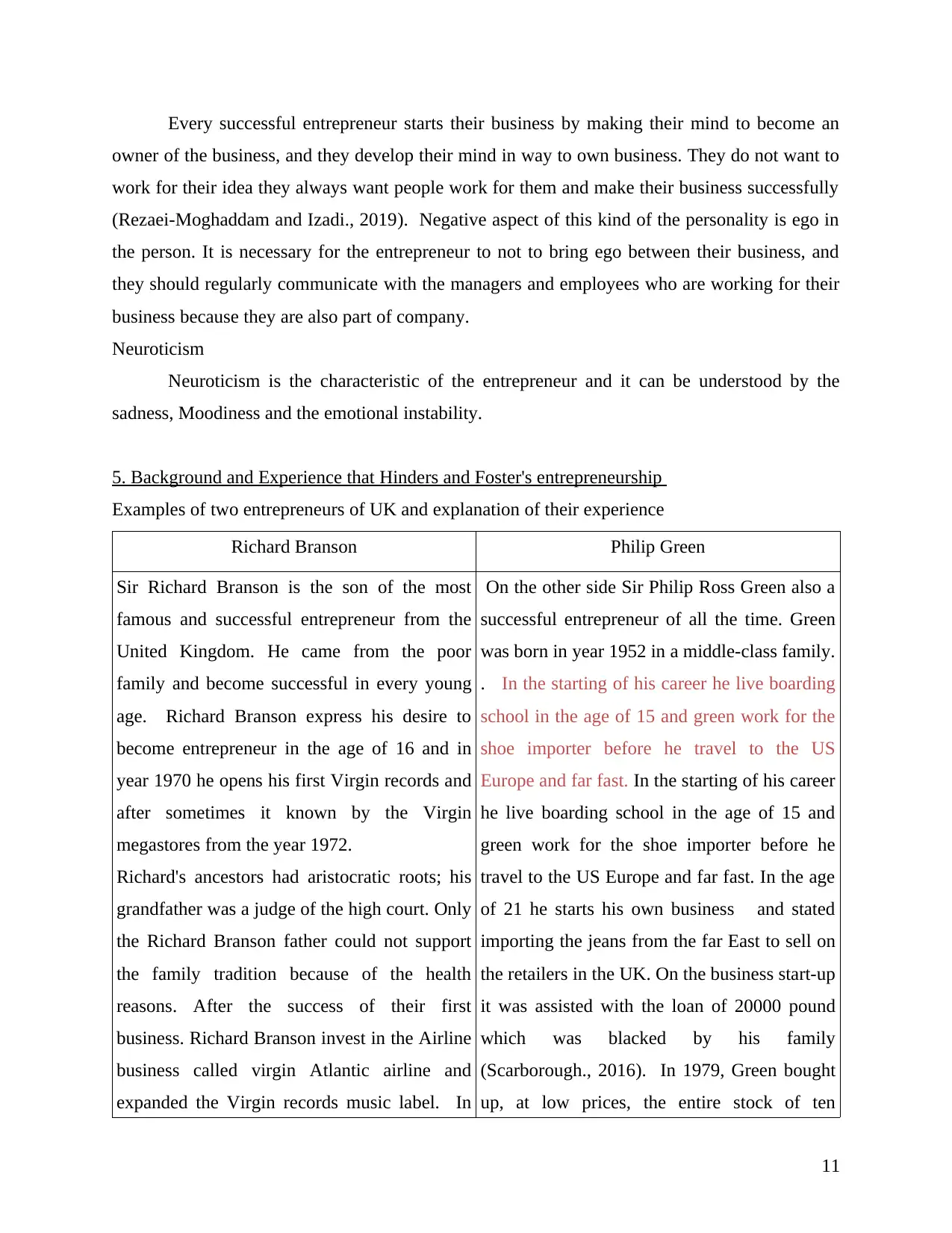
Every successful entrepreneur starts their business by making their mind to become an
owner of the business, and they develop their mind in way to own business. They do not want to
work for their idea they always want people work for them and make their business successfully
(Rezaei-Moghaddam and Izadi., 2019). Negative aspect of this kind of the personality is ego in
the person. It is necessary for the entrepreneur to not to bring ego between their business, and
they should regularly communicate with the managers and employees who are working for their
business because they are also part of company.
Neuroticism
Neuroticism is the characteristic of the entrepreneur and it can be understood by the
sadness, Moodiness and the emotional instability.
5. Background and Experience that Hinders and Foster's entrepreneurship
Examples of two entrepreneurs of UK and explanation of their experience
Richard Branson Philip Green
Sir Richard Branson is the son of the most
famous and successful entrepreneur from the
United Kingdom. He came from the poor
family and become successful in every young
age. Richard Branson express his desire to
become entrepreneur in the age of 16 and in
year 1970 he opens his first Virgin records and
after sometimes it known by the Virgin
megastores from the year 1972.
Richard's ancestors had aristocratic roots; his
grandfather was a judge of the high court. Only
the Richard Branson father could not support
the family tradition because of the health
reasons. After the success of their first
business. Richard Branson invest in the Airline
business called virgin Atlantic airline and
expanded the Virgin records music label. In
On the other side Sir Philip Ross Green also a
successful entrepreneur of all the time. Green
was born in year 1952 in a middle-class family.
. In the starting of his career he live boarding
school in the age of 15 and green work for the
shoe importer before he travel to the US
Europe and far fast. In the starting of his career
he live boarding school in the age of 15 and
green work for the shoe importer before he
travel to the US Europe and far fast. In the age
of 21 he starts his own business and stated
importing the jeans from the far East to sell on
the retailers in the UK. On the business start-up
it was assisted with the loan of 20000 pound
which was blacked by his family
(Scarborough., 2016). In 1979, Green bought
up, at low prices, the entire stock of ten
11
owner of the business, and they develop their mind in way to own business. They do not want to
work for their idea they always want people work for them and make their business successfully
(Rezaei-Moghaddam and Izadi., 2019). Negative aspect of this kind of the personality is ego in
the person. It is necessary for the entrepreneur to not to bring ego between their business, and
they should regularly communicate with the managers and employees who are working for their
business because they are also part of company.
Neuroticism
Neuroticism is the characteristic of the entrepreneur and it can be understood by the
sadness, Moodiness and the emotional instability.
5. Background and Experience that Hinders and Foster's entrepreneurship
Examples of two entrepreneurs of UK and explanation of their experience
Richard Branson Philip Green
Sir Richard Branson is the son of the most
famous and successful entrepreneur from the
United Kingdom. He came from the poor
family and become successful in every young
age. Richard Branson express his desire to
become entrepreneur in the age of 16 and in
year 1970 he opens his first Virgin records and
after sometimes it known by the Virgin
megastores from the year 1972.
Richard's ancestors had aristocratic roots; his
grandfather was a judge of the high court. Only
the Richard Branson father could not support
the family tradition because of the health
reasons. After the success of their first
business. Richard Branson invest in the Airline
business called virgin Atlantic airline and
expanded the Virgin records music label. In
On the other side Sir Philip Ross Green also a
successful entrepreneur of all the time. Green
was born in year 1952 in a middle-class family.
. In the starting of his career he live boarding
school in the age of 15 and green work for the
shoe importer before he travel to the US
Europe and far fast. In the starting of his career
he live boarding school in the age of 15 and
green work for the shoe importer before he
travel to the US Europe and far fast. In the age
of 21 he starts his own business and stated
importing the jeans from the far East to sell on
the retailers in the UK. On the business start-up
it was assisted with the loan of 20000 pound
which was blacked by his family
(Scarborough., 2016). In 1979, Green bought
up, at low prices, the entire stock of ten
11
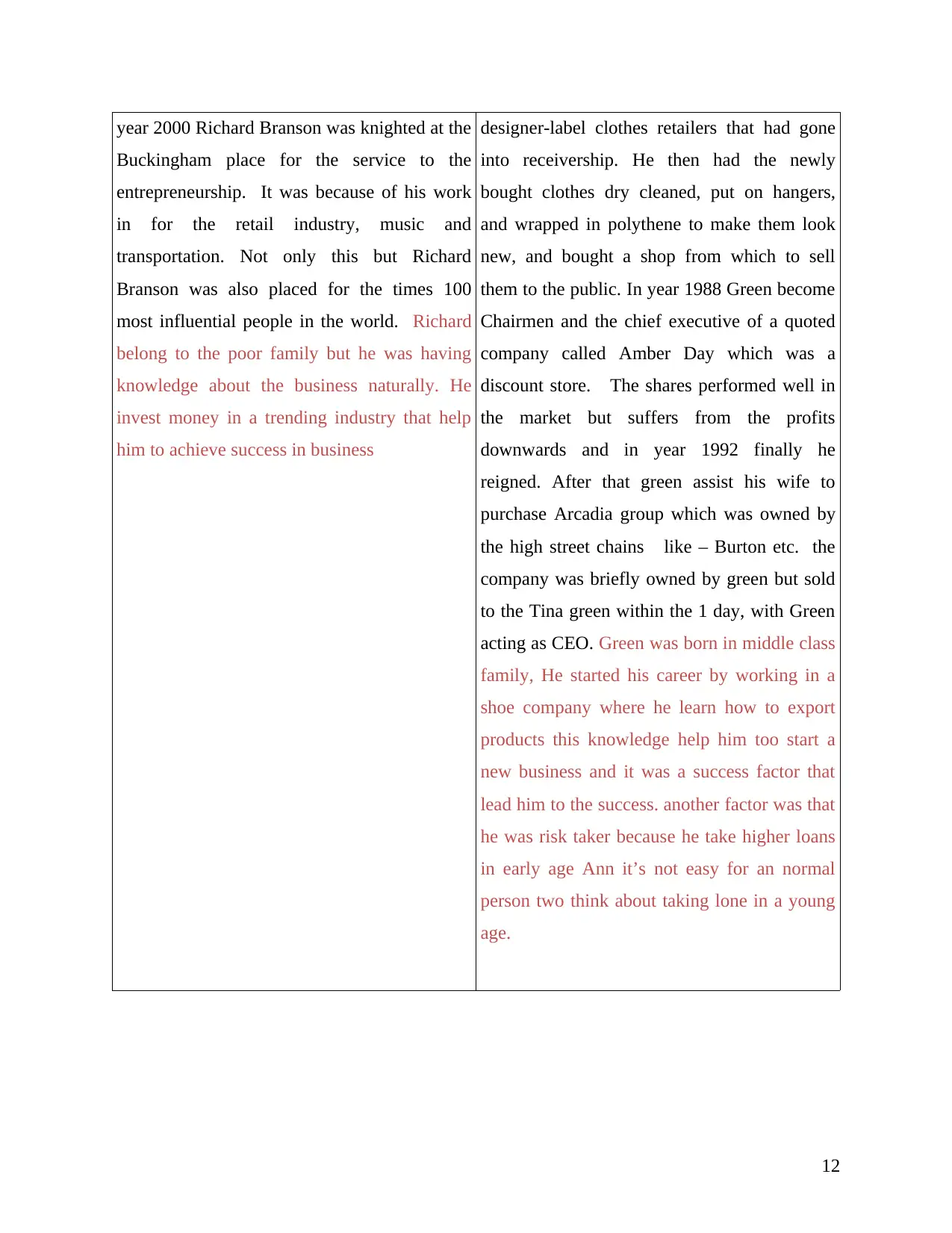
year 2000 Richard Branson was knighted at the
Buckingham place for the service to the
entrepreneurship. It was because of his work
in for the retail industry, music and
transportation. Not only this but Richard
Branson was also placed for the times 100
most influential people in the world. Richard
belong to the poor family but he was having
knowledge about the business naturally. He
invest money in a trending industry that help
him to achieve success in business
designer-label clothes retailers that had gone
into receivership. He then had the newly
bought clothes dry cleaned, put on hangers,
and wrapped in polythene to make them look
new, and bought a shop from which to sell
them to the public. In year 1988 Green become
Chairmen and the chief executive of a quoted
company called Amber Day which was a
discount store. The shares performed well in
the market but suffers from the profits
downwards and in year 1992 finally he
reigned. After that green assist his wife to
purchase Arcadia group which was owned by
the high street chains like – Burton etc. the
company was briefly owned by green but sold
to the Tina green within the 1 day, with Green
acting as CEO. Green was born in middle class
family, He started his career by working in a
shoe company where he learn how to export
products this knowledge help him too start a
new business and it was a success factor that
lead him to the success. another factor was that
he was risk taker because he take higher loans
in early age Ann it’s not easy for an normal
person two think about taking lone in a young
age.
12
Buckingham place for the service to the
entrepreneurship. It was because of his work
in for the retail industry, music and
transportation. Not only this but Richard
Branson was also placed for the times 100
most influential people in the world. Richard
belong to the poor family but he was having
knowledge about the business naturally. He
invest money in a trending industry that help
him to achieve success in business
designer-label clothes retailers that had gone
into receivership. He then had the newly
bought clothes dry cleaned, put on hangers,
and wrapped in polythene to make them look
new, and bought a shop from which to sell
them to the public. In year 1988 Green become
Chairmen and the chief executive of a quoted
company called Amber Day which was a
discount store. The shares performed well in
the market but suffers from the profits
downwards and in year 1992 finally he
reigned. After that green assist his wife to
purchase Arcadia group which was owned by
the high street chains like – Burton etc. the
company was briefly owned by green but sold
to the Tina green within the 1 day, with Green
acting as CEO. Green was born in middle class
family, He started his career by working in a
shoe company where he learn how to export
products this knowledge help him too start a
new business and it was a success factor that
lead him to the success. another factor was that
he was risk taker because he take higher loans
in early age Ann it’s not easy for an normal
person two think about taking lone in a young
age.
12
⊘ This is a preview!⊘
Do you want full access?
Subscribe today to unlock all pages.

Trusted by 1+ million students worldwide
1 out of 15
Related Documents
Your All-in-One AI-Powered Toolkit for Academic Success.
+13062052269
info@desklib.com
Available 24*7 on WhatsApp / Email
![[object Object]](/_next/static/media/star-bottom.7253800d.svg)
Unlock your academic potential
Copyright © 2020–2026 A2Z Services. All Rights Reserved. Developed and managed by ZUCOL.




